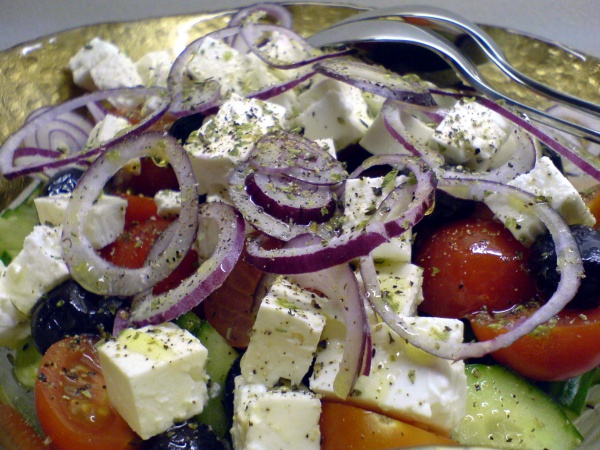Facts About Greek salad
Greek salad, traditionally known as horiatiki salad, is a cherished dish in Greek cuisine. It's typically composed of fresh tomatoes, cucumbers, onions, feta cheese, and olives, all seasoned with salt, pepper, Greek oregano, and olive oil. Extra ingredients like green bell pepper slices or caper berries can be added to enhance the flavor. The simplicity and freshness of its ingredients often make it a staple for breakfast or lunch, especially among farmers.
Interestingly, outside Greece, the term "Greek salad" can refer to a different dish. Often, it denotes a lettuce-based salad with Greek-inspired elements, although the authentic Greek salad does not include lettuce. To differentiate, the traditional version without lettuce is sometimes referred to as horiatiki, village salad, or peasant salad.
In the United States, a typical Greek salad commonly includes lettuce, tomatoes, feta, olives, cucumbers, peperoncini, bell peppers, onions, radishes, dolmades, and sometimes anchovies or sardines. There are regional variations as well, such as adding beets in Detroit or potato salad in the Tampa Bay area. American-style Greek salads often come with dressings made from a blend of herbs and seasonings, a style not usually found in Greece.
Greek and Cypriot cuisines offer a variety of other salads. These include marouli (lettuce, onion, and dill salad), lahanosalata (shredded cabbage salad with olive oil, lemon juice, and garlic), pantzarosalata (beetroot salad with olive oil and red wine vinegar), salata roka (arugula salad with olive oil and red wine vinegar or lemon juice), patatosalata (potato salad with olive oil, onions, and lemon juice or vinegar), revithosalata (chickpea salad), and mantanouri (parsley salad used as a condiment). Cypriot salad is similar to the Greek version, typically featuring tomatoes, capers, cucumbers, onions, parsley, and feta cheese, dressed with olive oil and lemon or red wine vinegar.
Beyond salads, Greek cuisine includes delectable spreads and dips like melitzanosalata, taramasalata, and tzatziki, which are also referred to as salads in Greek. Over time, the term "Greek salad" has evolved and been used in various contexts in English, often with no direct connection to Greek cuisine, demonstrating the versatility and adaptability of culinary terminology.

 United Kingdom
United Kingdom